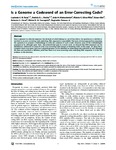Por favor, use este identificador para citar o enlazar este ítem:
http://www.alice.cnptia.embrapa.br/alice/handle/doc/925637| Título: | Is a genome a codeword of an error-correcting code? |
| Autor: | FARIA, L. C. B.  ROCHA, A. S. L.   KLEINSCHMIDT, J. H.   SILVA-FILHO, M. C.   BIM, E.   HERAI, R. H.   YAMAGISHI, M. E. B.   PALAZZO JÚNIOR, R.   |
| Afiliación: | LUZINETE C. B. FARIA, Unicamp; ANDRÉA S. L. ROCHA, Unicamp; JOÃO H. KLEINSCHMIDT, UFABC; MÁRCIO C. SILVA-FILHO, Esalq/USP; EDSON BIM, Unicamp; ROBERTO H. HERAI, University of California San Diego; MICHEL EDUARDO BELEZA YAMAGISHI, CNPTIA; REGINALDO PALAZZO JÚNIOR, Unicamp. |
| Año: | 2012 |
| Referencia: | PLoS ONE, San Francisco, v. 7, n. 5, p. 1-9, May 2012. |
| Descripción: | Since a genome is a discrete sequence, the elements of which belong to a set of four letters, the question as to whether or not there is an error-correcting code underlying DNA sequences is unavoidable. The most common approach to answering this question is to propose a methodology to verify the existence of such a code. However, none of the methodologies proposed so far, although quite clever, has achieved that goal. In a recent work, we showed that DNA sequences can be identified as codewords in a class of cyclic error-correcting codes known as Hamming codes. In this paper, we show that a complete intron-exon gene, and even a plasmid genome, can be identified as a Hamming code codeword as well. Although this does not constitute a definitive proof that there is an error-correcting code underlying DNA sequences, it is the first evidence in this direction. |
| Thesagro: | Biologia |
| NAL Thesaurus: | Genome Nucleotide sequences |
| Palabras clave: | Sequência de DNA Biology |
| Tipo de Material: | Artigo de periódico |
| Acceso: | openAccess |
| Aparece en las colecciones: | Artigo em periódico indexado (CNPTIA)  |
Ficheros en este ítem:
| Fichero | Descripción | Tamaño | Formato | |
|---|---|---|---|---|
| journal.pone.0036644.pdf | 826,36 kB | Adobe PDF |  Visualizar/Abrir |









